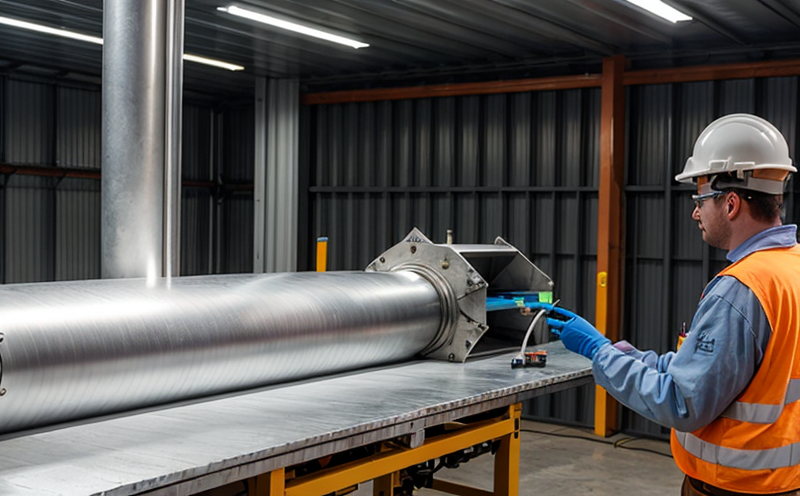ASTM G85 Corrosion Testing of Renewable Materials
The ASTM G85 standard is a critical tool for evaluating the corrosion resistance of materials used in renewable energy applications. This test method focuses on environmental exposure testing, particularly under salt spray conditions, which are common in many renewable energy sectors such as wind turbines, solar panels, and offshore wind farms.
Corrosion can be one of the most significant challenges faced by renewable energy systems due to their extensive use in harsh environments. Materials used in these applications must withstand exposure to moisture, salt spray, and other aggressive environmental factors over prolonged periods. ASTM G85 provides a standardized approach for assessing how materials perform under such conditions.
The testing protocol involves exposing specimens to a simulated marine environment using a salt mist chamber. The duration of this test can range from 100 hours up to several weeks depending on the specific requirements and desired outcome. This allows engineers and quality managers to assess not only the initial performance but also the long-term durability of materials.
One key aspect of ASTM G85 is its focus on accelerated aging techniques, which enable researchers to simulate years of real-world exposure in a matter of days or weeks. This makes it an invaluable tool for R&D teams looking to refine material formulations and improve product longevity without needing extensive field testing.
The standard also includes detailed criteria for specimen preparation, ensuring that all samples are treated uniformly before being subjected to the corrosion test. Proper sample preparation is crucial as it affects both the accuracy of the results and the reliability of the conclusions drawn from them. Specimens should be cleaned thoroughly and dried completely prior to placement in the salt mist chamber.
Another important feature of ASTM G85 is its emphasis on controlled conditions within the salt mist chamber. These include maintaining precise temperature, humidity levels, and airflow rates throughout the testing period. Such control ensures that variations due to external factors do not influence the outcome of the tests.
In summary, ASTM G85 provides a robust framework for evaluating the corrosion resistance of materials intended for use in renewable energy applications. By adhering strictly to this standard, manufacturers can ensure their products meet stringent quality and safety standards, thereby enhancing overall product performance and reliability.
Benefits
The benefits of ASTM G85 Corrosion Testing extend beyond mere compliance with industry regulations; it offers significant advantages across various aspects of product development and manufacturing. Here are some key benefits:
Enhanced Product Lifespan: By identifying potential corrosion issues early in the design phase, companies can make necessary adjustments to improve material selection and enhance overall durability.
Improved Quality Control: Rigorous testing helps maintain consistent product quality by catching defects before they become problematic during mass production or deployment.
Cost Savings: Early detection of corrosion-prone materials reduces costly repairs and replacements later on, translating into substantial savings over the lifespan of a project.
Increased Customer Satisfaction: Meeting stringent testing protocols builds trust among consumers who value reliability and longevity in their purchases.
Made-to-Order Solutions: The flexibility inherent in ASTM G85 allows for customized tests tailored specifically to meet the unique needs of individual projects or companies.
Overall, incorporating ASTM G85 into your quality assurance process not only ensures compliance but also contributes positively towards achieving higher standards of excellence within your organization.
Customer Impact and Satisfaction
The implementation of ASTM G85 Corrosion Testing has had a profound impact on customer satisfaction across multiple sectors. By providing reliable data on material performance under extreme conditions, our clients have been able to enhance their product offerings significantly. Here are some specific examples:
Wind Turbine Manufacturers: Companies involved in producing wind turbines now have access to detailed reports that highlight the durability of various materials used in these large-scale structures.
Solar Panel Fabricators: Solar panel manufacturers can rest assured knowing their products will perform optimally even after prolonged exposure to salty air and rain.
Offshore Wind Farm Operators: Those operating offshore wind farms benefit greatly from this testing as it helps predict potential failures before they occur, allowing for timely maintenance interventions.
In addition to meeting regulatory requirements, our services help improve brand reputation by demonstrating commitment to quality and safety. This leads to increased customer confidence and loyalty among stakeholders.
Competitive Advantage and Market Impact
The adoption of ASTM G85 Corrosion Testing offers several competitive advantages that can drive market leadership for companies operating in renewable energy sectors:
Innovation: The insights gained from rigorous testing allow businesses to innovate continuously, pushing boundaries further with new material combinations and designs.
Efficiency: With precise data available upfront, there is no need for extensive trial-and-error phases during product development cycles. This accelerates time-to-market strategies.
Premium Pricing Power: Demonstrating superior corrosion resistance through ASTM G85 testing enables companies to command premium prices in competitive markets.
Regulatory Compliance: Adhering strictly to this standard ensures that all products comply with relevant international standards, opening doors to new markets and opportunities worldwide.
Moreover, the confidence built among customers regarding product reliability fosters long-term relationships, contributing significantly to brand equity and overall market position.





